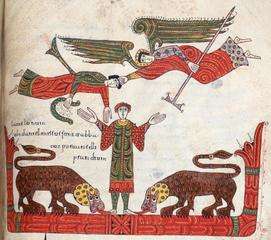|
Back
An 800-year-old hit show Toronto
The Trinity-St Paul’s Centre
05/22/2015 - & May 23*, 24, 2015
Anon: The Play of Daniel
Kevin Skelton (Daniel), Olivier Laquerre (Belshazzar), Michelle DeBoer (Queen, Angel), Derek Kwan (Noble, Darius), Bud Roach (Noble, Jealous Counsellor), John Pepper (Magus, Habakkuk), David Fallis (Magus, Jealous Counsellor), Paul Jenkins (Noble, Lions’ Den Angel), Heidi Strauss (Attendant), Brodie Stevenson (Attendant)
Toronto Consort Players and Viva! Youth Singers, David Fallis (musical direction)
Alex Fallis (director), Glenn Davidson (set, lighting, and projection designer), Michelle Bailey (costume designer)

The Play of Daniel is a liturgical drama from Beauvais Cathedral dating from the early 13th century. Thus it is about 800 years old. Its title derives from its Latin title Ludus Danielis, but it is not just a spoken play or a play with music, but is sung throughout. Each stage action is announced before it is enacted, and even these stage directions are set to music. It can be described as a proto-opera, although opera as we know it sprang into being almost 400 years later, far away, and in a secular context.
Its length of just one hour contains a good deal of incident, recounting two colourful episodes from the biblical Book of Daniel. The first tells of the court of the Babylonian king Belshazzar and the rollicking festivities therein. The mysterious writing appears on the wall and the queen urges the king to summon Daniel to explain what it means. He arrives and gives the king the ominous message that his days are numbered. The king responds by heaping honours upon Daniel, although the prophecy quickly comes true as Darius arrives and drives Belshazzar from the throne. Darius promotes Daniel to even greater honours, which arouses envy in other courtiers. They spy on Daniel and report that in private he worships his own god instead of Darius. For this he is thrown into the lions’ den. An angel intervenes; the lions fail to devour Daniel and the angel leads an old man, Habakkuk, to deliver food to Daniel. Darius sees this and is impressed by the power of Daniel’s god; he consigns his advisors to the lions’ den, and commands his people to follow this powerful god. It ends with a pious Te Deum accompanied by gongs and cymbals.
The work was first performed marking festivities during the 12 days of Christmas. There is a lot of light-hearted jollity amidst the two serious episodes involving the biblical hero. It comes as no surprise that the narrative music is troubadoresque. Other sections are more like plainchant, and other stretches are much like the secular music Carl Orff used for Carmina Burana.
With such a large number of solo roles, none is of any great length, not even the title role. Daniel turns out to be a rather laconic, self-effacing hero not given to grand gestures or utterances, which is just how Kevin Skelton, in fine voice, performs the role. The closest thing anyone has to an aria is Belshazzar’s Queen. Michele DeBoer handles this role - and the plum role of the Angel - with a glowing, silvery voice. The two kings are vividly portrayed by Olivier Laquerre as Belshazzar, and Derek Kwan as a clownish Darius.
By far the longest role is that for the chorus. Twenty-two members of Viva! Youth Singers of Toronto, made up of high school students, gave a committed performance. The work is in Latin, and to make it more accessible and enjoyable for both the students and audience, the Consort’s founder/musical director David Fallis made his own rhyming translation, sometimes just plain goofy, sometimes highly serious. It came across extremely well. Some phrases remain in Latin; they, plus a few in antique French, added a piquant touch.
The costuming added to the fun. However I didn’t see the point of constructing on the stage two arches based in those in the Mezquita in Cordoba, Spain. The performance is already in a church (even if the space is now called Jeanne Lamon Hall) and there is no connection between a work from Northern France and a former mosque in Spain (is there?) And why did the mysterious words that condemned Belshazzar appear in Arabic? One of the points of the story is that they were in Hebrew, the native language of the learned Daniel, during the Israelites’ Babylonian captivity.
Lively accompaniment was accomplished by just four instrumentalists from the Toronto Consort. Mind you, they were kept busy using 11 instruments. Since musical director David Fallis was also performing two roles in the piece, there was no conducting as such, thus in true consort style. (The Toronto Consort’s entire repertoire dates from well before the appearance of the stand-alone conductor.)
This was a large-scale project for the Toronto Consort and was launched to help celebrate its 40th anniversary season in 2012. The result: an enjoyable, insightful experience.
Michael Johnson
|